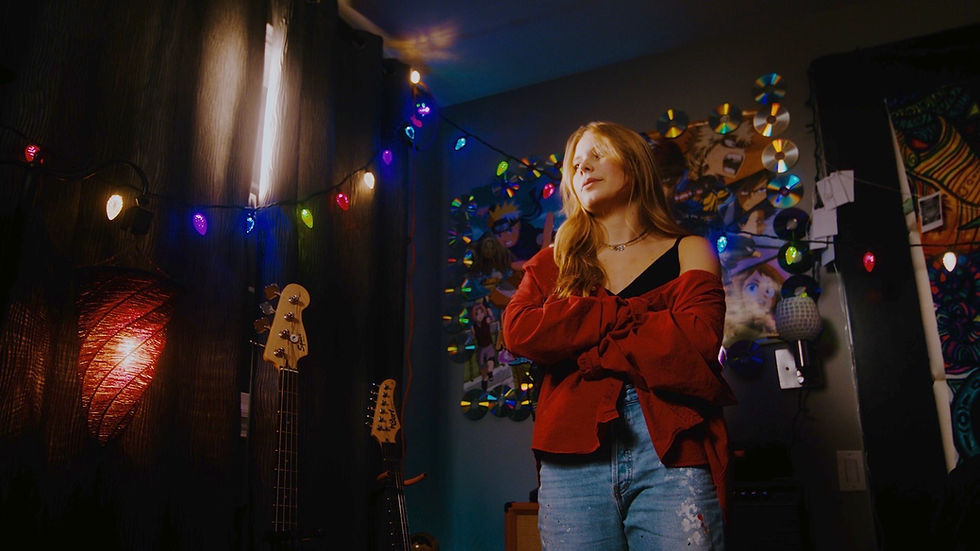Dimanche [Fatty Soprano & Shutterr, Canada, 2021]
- Will Whitehead

- Oct 10, 2021
- 2 min read
In Dimanche, Fatty Soprano and Shutterr are at their dazzling, beguiling best. This entrancing short is intensely atmospheric, with characteristically stunning cinematography from Shutterr and a complicated, multi-faceted narrative that feels enormous and far exceeds the brief runtime. Filled with sensitivity and a rejection of simplicity, Dimanche manages to create a film that lulls the viewer in while challenging their perceptions about femininity and womanhood.

Dimanche focuses on a conversation between two young people: a girl on the verge of eighteen, lost and confused in the world of her own sexuality, and her sibling who is discovering their gender identity through wearing make-up and feminine clothes. The older sister does all the talking, trying to unravel her thoughts on a classmate who has had breast implants while applying makeup to her sibling who remains silent. The younger sibling listens intently, allowing their sister to transform them as she speaks. Ultimately, however, the trancelike atmosphere is broken as the siblings’ father comes home and flexes a belt with terrifying menace.
As is to be expected from Soprano and Shutterr, Dimanche is dripping with atmosphere. The cinematography is intimate and dreamlike, utilising strong colours and a soft focus to create a nostalgic and surreal feel. The bedroom setting is its own universe, filled with emblems of American culture, which is at odds with the French-Canadian film. The copies of The Great Gatsby, The Grapes of Wrath and an issue of The New Yorker all stand out like gravestones, obsolete pillars of a masculine culture that is no longer relevant. The femininity of each protagonist is consolidated by the music, which is simple and affecting, emphasising their youthful innocence, and making the sister’s obsession with her sexuality all the more heartbreaking. Soprano and Shutterr’s ability to draw the audience close through music, cinematography and incredibly natural direction is in full force, crafting subtle pockets of emotion that elevate and strengthen the film.

There is a tendency, in contemporary culture, to simplify and reduce the experience of womanhood to a set of arbitrary characteristics. Dimanche dismantles this reductive mindset in its intertwining of the two protagonists’ experiences. The older sister is perplexed by the aesthetic superficiality of sex, unable to measure her own sense of self-worth without obsessing over the size of her breasts. This obsession is legitimised by the seemingly positive impact of her classmate’s breast implants, corroborating the idea that a woman’s worth is measured by their physical characteristics. Conversely, however, her younger sibling is seeking solace in the aesthetic elements of womanhood. Makeup and women’s clothing seem to validate their existence, representing an ability to escape the constraints of their own gender and create something truer to them. While they are performing womanhood in the way it is “supposed” to be performed, the final scene illustrates the threat of fatherly violence for doing exactly that.
There is no way to win for either of the two protagonists – womanhood under patriarchy is a paradox. This is Soprano and Shutterr’s crowning achievement with Dimanche - creating a film about young womanhood, which does not fall into any traps and refuses to oversimplify, instead emphasising compassion and sensitivity towards its subjects who are trapped within a system they did not choose to enter.

.png)




![SHORT FOCUS 2022: So What Did We Learn Today, Georgina? [Franco Volpi, UK, 2022]](https://static.wixstatic.com/media/9b7dde_f048f3b1e32c48918d83c1285916aa3c~mv2.png/v1/fill/w_447,h_250,fp_0.50_0.50,q_35,blur_30,enc_avif,quality_auto/9b7dde_f048f3b1e32c48918d83c1285916aa3c~mv2.webp)
![SHORT FOCUS 2022: So What Did We Learn Today, Georgina? [Franco Volpi, UK, 2022]](https://static.wixstatic.com/media/9b7dde_f048f3b1e32c48918d83c1285916aa3c~mv2.png/v1/fill/w_220,h_123,fp_0.50_0.50,q_95,enc_avif,quality_auto/9b7dde_f048f3b1e32c48918d83c1285916aa3c~mv2.webp)
![Two Knights [Piotr Szkopiak, UK, 2022]](https://static.wixstatic.com/media/9b7dde_4b197f184db54afc95f775fe48320bd7~mv2.jpeg/v1/fill/w_447,h_250,fp_0.50_0.50,q_30,blur_30,enc_avif,quality_auto/9b7dde_4b197f184db54afc95f775fe48320bd7~mv2.webp)
![Two Knights [Piotr Szkopiak, UK, 2022]](https://static.wixstatic.com/media/9b7dde_4b197f184db54afc95f775fe48320bd7~mv2.jpeg/v1/fill/w_220,h_123,fp_0.50_0.50,q_90,enc_avif,quality_auto/9b7dde_4b197f184db54afc95f775fe48320bd7~mv2.webp)
![SHORT FOCUS 2022: Throw Your Heart Over First [Mark McAuley, Ireland, 2021]](https://static.wixstatic.com/media/9b7dde_f17e64582f494d729a117bddc19545a9~mv2.png/v1/fill/w_447,h_250,fp_0.50_0.50,q_35,blur_30,enc_avif,quality_auto/9b7dde_f17e64582f494d729a117bddc19545a9~mv2.webp)
![SHORT FOCUS 2022: Throw Your Heart Over First [Mark McAuley, Ireland, 2021]](https://static.wixstatic.com/media/9b7dde_f17e64582f494d729a117bddc19545a9~mv2.png/v1/fill/w_220,h_123,fp_0.50_0.50,q_95,enc_avif,quality_auto/9b7dde_f17e64582f494d729a117bddc19545a9~mv2.webp)
![Borrowed Time [Ginevra Gentili, UK, 2022]](https://static.wixstatic.com/media/9b7dde_ed0c27adf0984653a11c5104f74a1b58~mv2.jpeg/v1/fill/w_447,h_250,fp_0.50_0.50,q_30,blur_30,enc_avif,quality_auto/9b7dde_ed0c27adf0984653a11c5104f74a1b58~mv2.webp)
![Borrowed Time [Ginevra Gentili, UK, 2022]](https://static.wixstatic.com/media/9b7dde_ed0c27adf0984653a11c5104f74a1b58~mv2.jpeg/v1/fill/w_220,h_123,fp_0.50_0.50,q_90,enc_avif,quality_auto/9b7dde_ed0c27adf0984653a11c5104f74a1b58~mv2.webp)
![SHORT FOCUS 2021: Cornflakes Are Rubbish [Charlotte Nind/Jacob Bacon, UK, 2021]](https://static.wixstatic.com/media/9b7dde_800e4f3cde6147399b1eee00f4337095~mv2.jpeg/v1/fill/w_447,h_250,fp_0.50_0.50,q_30,blur_30,enc_avif,quality_auto/9b7dde_800e4f3cde6147399b1eee00f4337095~mv2.webp)
![SHORT FOCUS 2021: Cornflakes Are Rubbish [Charlotte Nind/Jacob Bacon, UK, 2021]](https://static.wixstatic.com/media/9b7dde_800e4f3cde6147399b1eee00f4337095~mv2.jpeg/v1/fill/w_220,h_123,fp_0.50_0.50,q_90,enc_avif,quality_auto/9b7dde_800e4f3cde6147399b1eee00f4337095~mv2.webp)
![SHORT FOCUS 2021: Original Sin [Paolo Sinigaglia, Italy, 2020]](https://static.wixstatic.com/media/9b7dde_ca789cc5313b4f94bf20f025dc4796ee~mv2.jpg/v1/fill/w_447,h_250,fp_0.50_0.50,q_30,blur_30,enc_avif,quality_auto/9b7dde_ca789cc5313b4f94bf20f025dc4796ee~mv2.webp)
![SHORT FOCUS 2021: Original Sin [Paolo Sinigaglia, Italy, 2020]](https://static.wixstatic.com/media/9b7dde_ca789cc5313b4f94bf20f025dc4796ee~mv2.jpg/v1/fill/w_220,h_123,fp_0.50_0.50,q_90,enc_avif,quality_auto/9b7dde_ca789cc5313b4f94bf20f025dc4796ee~mv2.webp)
![SHORT FOCUS 2021: Shallow [Paul Ashton, UK, 2021]](https://static.wixstatic.com/media/9b7dde_951699be78e74888bc681fcd9d6c24cc~mv2.jpg/v1/fill/w_447,h_250,fp_0.50_0.50,q_30,blur_30,enc_avif,quality_auto/9b7dde_951699be78e74888bc681fcd9d6c24cc~mv2.webp)
![SHORT FOCUS 2021: Shallow [Paul Ashton, UK, 2021]](https://static.wixstatic.com/media/9b7dde_951699be78e74888bc681fcd9d6c24cc~mv2.jpg/v1/fill/w_220,h_123,fp_0.50_0.50,q_90,enc_avif,quality_auto/9b7dde_951699be78e74888bc681fcd9d6c24cc~mv2.webp)
![SHORT FOCUS 2021: Bohemia [Samuel Kaperski, France, 2019]](https://static.wixstatic.com/media/9b7dde_d748c63a3c814cb99859c13d18c00d7d~mv2.jpg/v1/fill/w_447,h_250,fp_0.50_0.50,q_30,blur_30,enc_avif,quality_auto/9b7dde_d748c63a3c814cb99859c13d18c00d7d~mv2.webp)
![SHORT FOCUS 2021: Bohemia [Samuel Kaperski, France, 2019]](https://static.wixstatic.com/media/9b7dde_d748c63a3c814cb99859c13d18c00d7d~mv2.jpg/v1/fill/w_220,h_123,fp_0.50_0.50,q_90,enc_avif,quality_auto/9b7dde_d748c63a3c814cb99859c13d18c00d7d~mv2.webp)




![SHORT FOCUS 2022: So What Did We Learn Today, Georgina? [Franco Volpi, UK, 2022]](https://static.wixstatic.com/media/9b7dde_f048f3b1e32c48918d83c1285916aa3c~mv2.png/v1/fill/w_327,h_250,fp_0.50_0.50,q_35,blur_30,enc_avif,quality_auto/9b7dde_f048f3b1e32c48918d83c1285916aa3c~mv2.webp)
![SHORT FOCUS 2022: So What Did We Learn Today, Georgina? [Franco Volpi, UK, 2022]](https://static.wixstatic.com/media/9b7dde_f048f3b1e32c48918d83c1285916aa3c~mv2.png/v1/fill/w_51,h_39,fp_0.50_0.50,q_95,enc_avif,quality_auto/9b7dde_f048f3b1e32c48918d83c1285916aa3c~mv2.webp)
![In the Eyes of a Child [Marco Ferrara, Italy, 2023]](https://static.wixstatic.com/media/9b7dde_01e294bd769e4a8aa341551ca7bc7871~mv2.jpeg/v1/fill/w_327,h_250,fp_0.50_0.50,q_30,blur_30,enc_avif,quality_auto/9b7dde_01e294bd769e4a8aa341551ca7bc7871~mv2.webp)
![In the Eyes of a Child [Marco Ferrara, Italy, 2023]](https://static.wixstatic.com/media/9b7dde_01e294bd769e4a8aa341551ca7bc7871~mv2.jpeg/v1/fill/w_51,h_39,fp_0.50_0.50,q_90,enc_avif,quality_auto/9b7dde_01e294bd769e4a8aa341551ca7bc7871~mv2.webp)
![Two Knights [Piotr Szkopiak, UK, 2022]](https://static.wixstatic.com/media/9b7dde_4b197f184db54afc95f775fe48320bd7~mv2.jpeg/v1/fill/w_327,h_250,fp_0.50_0.50,q_30,blur_30,enc_avif,quality_auto/9b7dde_4b197f184db54afc95f775fe48320bd7~mv2.webp)
![Two Knights [Piotr Szkopiak, UK, 2022]](https://static.wixstatic.com/media/9b7dde_4b197f184db54afc95f775fe48320bd7~mv2.jpeg/v1/fill/w_51,h_39,fp_0.50_0.50,q_90,enc_avif,quality_auto/9b7dde_4b197f184db54afc95f775fe48320bd7~mv2.webp)
![SHORT FOCUS 2022: Throw Your Heart Over First [Mark McAuley, Ireland, 2021]](https://static.wixstatic.com/media/9b7dde_f17e64582f494d729a117bddc19545a9~mv2.png/v1/fill/w_327,h_250,fp_0.50_0.50,q_35,blur_30,enc_avif,quality_auto/9b7dde_f17e64582f494d729a117bddc19545a9~mv2.webp)
![SHORT FOCUS 2022: Throw Your Heart Over First [Mark McAuley, Ireland, 2021]](https://static.wixstatic.com/media/9b7dde_f17e64582f494d729a117bddc19545a9~mv2.png/v1/fill/w_51,h_39,fp_0.50_0.50,q_95,enc_avif,quality_auto/9b7dde_f17e64582f494d729a117bddc19545a9~mv2.webp)
![The Story of a Trout [Gareth Leah, USA, 2022]](https://static.wixstatic.com/media/9b7dde_044565b04f7b4b6da729f134c619e377~mv2.jpeg/v1/fill/w_327,h_250,fp_0.50_0.50,q_30,blur_30,enc_avif,quality_auto/9b7dde_044565b04f7b4b6da729f134c619e377~mv2.webp)
![The Story of a Trout [Gareth Leah, USA, 2022]](https://static.wixstatic.com/media/9b7dde_044565b04f7b4b6da729f134c619e377~mv2.jpeg/v1/fill/w_51,h_39,fp_0.50_0.50,q_90,enc_avif,quality_auto/9b7dde_044565b04f7b4b6da729f134c619e377~mv2.webp)
![My Name is Moe [Kabir McNeely, USA, 2022]](https://static.wixstatic.com/media/9b7dde_680ffd6c85f642a6844b8785364c4288~mv2.jpg/v1/fill/w_327,h_250,fp_0.50_0.50,q_30,blur_30,enc_avif,quality_auto/9b7dde_680ffd6c85f642a6844b8785364c4288~mv2.webp)
![My Name is Moe [Kabir McNeely, USA, 2022]](https://static.wixstatic.com/media/9b7dde_680ffd6c85f642a6844b8785364c4288~mv2.jpg/v1/fill/w_51,h_39,fp_0.50_0.50,q_90,enc_avif,quality_auto/9b7dde_680ffd6c85f642a6844b8785364c4288~mv2.webp)
![Borrowed Time [Ginevra Gentili, UK, 2022]](https://static.wixstatic.com/media/9b7dde_ed0c27adf0984653a11c5104f74a1b58~mv2.jpeg/v1/fill/w_327,h_250,fp_0.50_0.50,q_30,blur_30,enc_avif,quality_auto/9b7dde_ed0c27adf0984653a11c5104f74a1b58~mv2.webp)
![Borrowed Time [Ginevra Gentili, UK, 2022]](https://static.wixstatic.com/media/9b7dde_ed0c27adf0984653a11c5104f74a1b58~mv2.jpeg/v1/fill/w_51,h_39,fp_0.50_0.50,q_90,enc_avif,quality_auto/9b7dde_ed0c27adf0984653a11c5104f74a1b58~mv2.webp)
![SHORT FOCUS 2021: Cornflakes Are Rubbish [Charlotte Nind/Jacob Bacon, UK, 2021]](https://static.wixstatic.com/media/9b7dde_800e4f3cde6147399b1eee00f4337095~mv2.jpeg/v1/fill/w_327,h_250,fp_0.50_0.50,q_30,blur_30,enc_avif,quality_auto/9b7dde_800e4f3cde6147399b1eee00f4337095~mv2.webp)
![SHORT FOCUS 2021: Cornflakes Are Rubbish [Charlotte Nind/Jacob Bacon, UK, 2021]](https://static.wixstatic.com/media/9b7dde_800e4f3cde6147399b1eee00f4337095~mv2.jpeg/v1/fill/w_51,h_39,fp_0.50_0.50,q_90,enc_avif,quality_auto/9b7dde_800e4f3cde6147399b1eee00f4337095~mv2.webp)
![The Skin She Sheds [Cass Virdee, UK, 2022]](https://static.wixstatic.com/media/9b7dde_bddd09258c164b9a90431ffd228c378a~mv2.jpeg/v1/fill/w_327,h_250,fp_0.50_0.50,q_30,blur_30,enc_avif,quality_auto/9b7dde_bddd09258c164b9a90431ffd228c378a~mv2.webp)
![The Skin She Sheds [Cass Virdee, UK, 2022]](https://static.wixstatic.com/media/9b7dde_bddd09258c164b9a90431ffd228c378a~mv2.jpeg/v1/fill/w_51,h_39,fp_0.50_0.50,q_90,enc_avif,quality_auto/9b7dde_bddd09258c164b9a90431ffd228c378a~mv2.webp)
![SHORT FOCUS 2021: Original Sin [Paolo Sinigaglia, Italy, 2020]](https://static.wixstatic.com/media/9b7dde_ca789cc5313b4f94bf20f025dc4796ee~mv2.jpg/v1/fill/w_327,h_250,fp_0.50_0.50,q_30,blur_30,enc_avif,quality_auto/9b7dde_ca789cc5313b4f94bf20f025dc4796ee~mv2.webp)
![SHORT FOCUS 2021: Original Sin [Paolo Sinigaglia, Italy, 2020]](https://static.wixstatic.com/media/9b7dde_ca789cc5313b4f94bf20f025dc4796ee~mv2.jpg/v1/fill/w_51,h_39,fp_0.50_0.50,q_90,enc_avif,quality_auto/9b7dde_ca789cc5313b4f94bf20f025dc4796ee~mv2.webp)
![SHORT FOCUS 2021: Shallow [Paul Ashton, UK, 2021]](https://static.wixstatic.com/media/9b7dde_951699be78e74888bc681fcd9d6c24cc~mv2.jpg/v1/fill/w_327,h_250,fp_0.50_0.50,q_30,blur_30,enc_avif,quality_auto/9b7dde_951699be78e74888bc681fcd9d6c24cc~mv2.webp)
![SHORT FOCUS 2021: Shallow [Paul Ashton, UK, 2021]](https://static.wixstatic.com/media/9b7dde_951699be78e74888bc681fcd9d6c24cc~mv2.jpg/v1/fill/w_51,h_39,fp_0.50_0.50,q_90,enc_avif,quality_auto/9b7dde_951699be78e74888bc681fcd9d6c24cc~mv2.webp)
![SHORT FOCUS 2021: Bohemia [Samuel Kaperski, France, 2019]](https://static.wixstatic.com/media/9b7dde_d748c63a3c814cb99859c13d18c00d7d~mv2.jpg/v1/fill/w_327,h_250,fp_0.50_0.50,q_30,blur_30,enc_avif,quality_auto/9b7dde_d748c63a3c814cb99859c13d18c00d7d~mv2.webp)
![SHORT FOCUS 2021: Bohemia [Samuel Kaperski, France, 2019]](https://static.wixstatic.com/media/9b7dde_d748c63a3c814cb99859c13d18c00d7d~mv2.jpg/v1/fill/w_51,h_39,fp_0.50_0.50,q_90,enc_avif,quality_auto/9b7dde_d748c63a3c814cb99859c13d18c00d7d~mv2.webp)
![SHORT FOCUS 2021: Yuluu [Fatima Kried, UK, 2021]](https://static.wixstatic.com/media/9b7dde_eb393025c61143cf98b6e551df4adf77~mv2.jpg/v1/fill/w_327,h_250,fp_0.50_0.50,q_30,blur_30,enc_avif,quality_auto/9b7dde_eb393025c61143cf98b6e551df4adf77~mv2.webp)
![SHORT FOCUS 2021: Yuluu [Fatima Kried, UK, 2021]](https://static.wixstatic.com/media/9b7dde_eb393025c61143cf98b6e551df4adf77~mv2.jpg/v1/fill/w_51,h_39,fp_0.50_0.50,q_90,enc_avif,quality_auto/9b7dde_eb393025c61143cf98b6e551df4adf77~mv2.webp)


